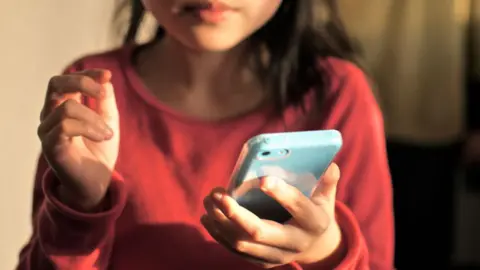 Getty Images
Getty ImagesThe US and the UK have announced what they say is their first joint agreement aimed at keeping children safer online.
It will see the setting up of a joint online safety working group to share evidence and expertise, and study the impact social media has on children.
UK Technology Secretary Peter Kyle said the agreement would turn the two countries’ “historic partnership” towards “delivering a safer online world for our next generation.”
But campaign group Smartphone Free Childhood said it was insufficient and parents “don’t have time to wait and see whether this UK-US agreement makes any difference when their children’s futures are at stake.”
However, others argue more evidence does need to be gathered in relation to online harms to guide any future policies.
“Policies and guidelines to support young people in navigating their digital world need to be based on robust evidence, but to date we haven’t had much success in establishing cause and effect when it comes to impacts on wellbeing,” said Prof Pete Etchells of Bath Spa University
Announcing the agreement, the UK government acknowledged there was “limited research and evidence on the causal impact that social media has on children and young people”.
It committed to consider ways access to more data held by big tech firms could be given to researchers.
‘Further and faster’
The agreement was announced in a joint statement between the two countries.
At its heart is the joint working group which will work on areas including “promoting better transparency from platforms” and “better understanding the impacts and risks of the digital world on young people, including new technologies like generative AI.”
They also said they expected tech platforms to go “further and faster” to protect children.
“As more children across the U.S. and around the globe have access to online platforms for online learning and social media, there is also increased risk to this exposure,” said U.S. Secretary of Commerce Gina Raimondo.
“That is why we are taking the necessary steps in the United States, and with our UK partners, to protect children’s privacy, safety, and mental health,” she added.
However, Smartphone Free Childhood said action was needed sooner, so it has launched a campaign calling on the UK government to ensure that children don’t have access to their mobile phones at school.
The campaign group argues that “further delay” from the government would make the UK looking “increasingly behind” other European countries who have strengthened restrictions.
Currently government guidance says that: “All schools should prohibit the use of mobile phones throughout the school day – not only during lessons but break and lunchtimes as well”.
However, the government so far says it has no plans to ban smartphone use for the under-16’s.
The UK’s Online Safety Act does place duties on online platforms to protect children’s safety and put in place measures to mitigate risks.
But this is not yet fully in force. Guidance for firms on how to comply with the new legislation is still being produced by the communications regulator Ofcom.


